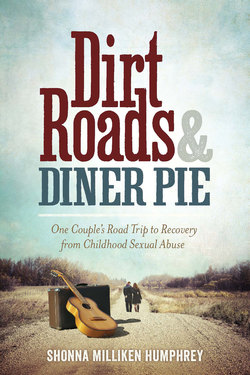Читать книгу Dirt Roads and Diner Pie - Shonna Milliken Humphrey - Страница 20
На сайте Литреса книга снята с продажи.
ОглавлениеCHAPTER EIGHT
Diner Pie
The sun set during the cross from New Jersey into Pennsylvania, and although the view of the road was dark, the space in the van felt measurably lighter. Trav turned down the radio and asked if I was hungry. Fresh air felt like a good goal, and the prospect of a leg stretch and some food felt even better.
Diners have a special significance for us because in addition to sharing diner pie on our first date, Trav and I believe “Breakfast served all day” is among the best sentences ever written. Eggs and toast, both inexpensive, offer a variety of choice—raisin or whole wheat with scrambled, over hard, or sunny-side up. “Whiskey toast,” shorthand for rye, makes us both smile. There is something real, authentic, and brave about facing a cup of cheap coffee. It lacks pretense. Add an original diner car, and the elements of nostalgia increase. The chrome, the wood, and the padded bar stools firmly bolted to the floor create a beauty that is accessible, interesting, and secure.
One goal not reached on this trip was a visit to Providence’s Johnson & Wales Culinary Arts Museum. Providence is where diners are reputed to have begun visiting Walter Scott’s horse-drawn “Night Lunch Wagon” in 1872. Opening after traditional eateries closed, Scott offered hot and inexpensive food to late-shift workers, including those in the newspaper and theater professions.
A long history of cheap dates for the artistic crew, I thought.
“Diner-like” is fine, too, and to this end we chose a smoky, wood-paneled Pennsylvania truck stop for our first road trip supper and were seated by a server with faded and blurry indigo wrist tattoos. The table card advertised ninety-nine-cent tacos on Mondays, and Trav questioned the wisdom of truck stop taco night while Gloria Jones’s original 1965 recording of “Tainted Love” played on the radio and I unfolded the cheap tin fork and knife wrapped tightly in a white paper napkin.
When I noted the music, Trav’s humor turned base.
“You said ‘’taint.’”
I earned a terminal degree in writing and literature, but I still giggled.
Trav ordered eggs poached hard, and I reassured the server that yes, he really does love them cooked tough like rubber balls. It was an affirmation I had repeated at many different breakfast tables as part of the strange intimacy of knowing precisely how a spouse prefers to eat eggs.
In home-style restaurants, I have noticed servers are more likely to use “you” instead of “the.” I mentioned as much when our own tattooed server stepped out of earshot with the menus tucked under her arm.
“How would you like your eggs?” is different from “How would you like the eggs?”
It might be a regional shift, but I suspect workers are smart to do this. It gives patrons a millisecond of power and importance. “Your eggs” makes a personal connection that “the eggs” lacks.
I noted the same for patrons. “I will take poached eggs” is more power-loaded than “May I please have poached eggs?” A weird cultural tic, I use it to separate the entitled from the considerate.
“You might be reading too much into it,” Trav said when our food arrived, having listened to me talk about the importance of grammar and specific modifiers, the idiocy of utilize, and skin-grating mixed metaphors, for fifteen solid minutes.
He cut into his egg, cooked hard and rubbery as requested, with a fork.
The coffee’s caffeine had kicked in, and just when I was about to begin a new declaration about the dumbing down of American culture, he set his fork onto his plate and squeezed my hand in a rare, spontaneous physical gesture.
“I am really glad we’re doing this trip,” he said.
And then: “You have eccentricities, too.” Seeing my face register a level of hurt, Trav quickly softened the assessment and squeezed my hand again. “But I love your nerd brain so fucking much.”
Love is patient, I remembered from the morning’s Massachusetts billboard, thinking about the importance of semantics while still holding hands over our plates, aware that love suffers long—in both directions.
